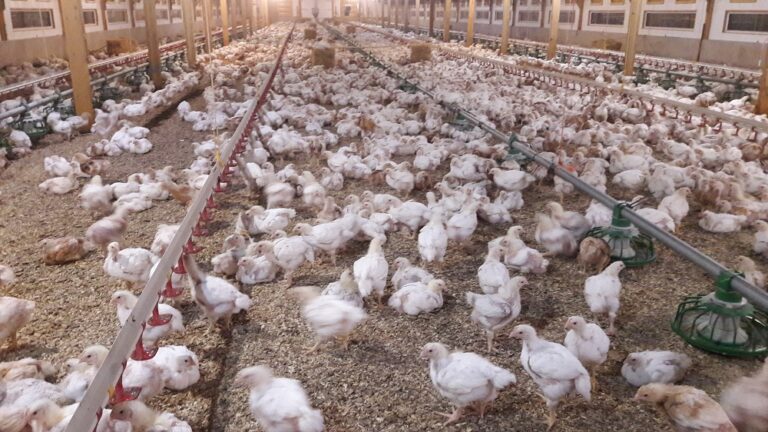Compassion in World Farming (CIWF) has responded at length to the bombshell report from AVEC, the Association of Poultry Processors and Poultry Trade in the EU Countries, which outlined the considerable financial and environmental costs associated with adopting the Better Chicken Commitment (BCC), otherwise known as the European Chicken Commitment (ECC).
The report, published in June, called ”Costs and Implications of the European Chicken Commitment in the EU” found that fully transitioning to ECC standards would result in:
An additional production cost of 37.5% per kilogram of meat, a 35.4% increase in water consumption, equating to an additional 12.44 million cubic meters annually, a 35.5% increase in feed consumption, amounting to an additional 7.3 million tonnes, a 24.4% rise in greenhouse gas emissions per kilogram of meat produced, a reduction of 44% in the total meat produced compared to standard production methods at present in existing EU growing space (>30kg/m²), and the necessity to construct 9,692 new poultry houses, with an estimated cost of €8.24 billion, to maintain current production levels.
In a detailed response, CIWF, one of the NGOs that helped develop and promote the BCC, said mitigating economic and environmental impacts would be critical to delivering better welfare for chickens reared for meat. But it also said it believed ultimately people should eat less chicken. “In order to achieve a higher welfare production model that does not harm the environment, we must firstly be prepared to produce and consume less chicken meat,” said Dr Tracey Jones, global director of food business at CIWF.
“ECC production poses economic and environmental challenges, as birds require more feed to produce the same amount of meat, are given more space to live and take longer to reach final body weight,” said Jones.
“Mitigating such challenges is critical to delivering the higher welfare for broiler chickens that is so urgently needed and requires a ‘can do’ attitude and mindset shift to break the limitations of business-as-usual intensive farming,
“Transitioning to ECC production is not straightforward – it requires investment and buy-in across the business, the supply chain and ultimately from the consumer.”
CIWF said AVEC’s report “falls short in accounting for the benefits associated with higher welfare production – including lower mortality, reduced antibiotic use and better meat quality, which could significantly offset some of these economic and environmental impacts.”
The NGO said the ECC was raising the bar for broiler welfare in Europe. “It may impact cost and environmental measures, but when combined with successful strategies – such as feed reformulation, full carcase utilisation or innovative product development, it can be commercially and environmentally viable,” said Jones.
By signing up to the ECC, companies commit to the use of slower growing breeds, providing more living space, natural light, perches and pecking substrates.
CIWF said there was scientific backing for the standards. The European Food Safety Authority (EFSA) released a significant scientific opinion in 2023, calling for a substantial shift in production systems to better align with the welfare needs of chickens, CIWF pointed out. Their recommendations cover all key ECC on-farm requirements (lower stocking density, slower growing breeds, enrichment and natural light) and will inform the revision of EU animal welfare legislation, including updates to the ‘Broiler Directive’ (Council Directive 2007/43/EC) on broiler chicken protection.
Over 380 companies have already signed up to the ECC. In the UK, Marks & Spencer now has 100% ECC-compliant fresh chicken on its shelves and is on track to convert its processed and ingredient chicken to meet the 2026 ECC deadline.
CIWF acknowledged in its response that: “It is undeniable that the transition from conventional to ECC production typically results in an increase in production costs, by providing more space per bird (and therefore fewer birds produced per shed) and using breeds that are slower growing (requiring more feed to produce the same amount of meat and reducing the number of production cycles per year). For the same reasons, switching to higher welfare may have a higher environmental impact.”
However, the NGO said these negative impacts “can and must be mitigated through an adjustment of practices.”
It described as “highly regrettable” that the AVEC report did not “consider cost-reduction strategies or the broader positive impacts a transition to higher welfare ECC standards will have, including on animal and human health and welfare” and instead focussed solely on the economic and environmental impacts.
“By excluding the breeding and processing phases, the report overlooked areas where ECC systems can outperform conventional systems, such as a better productivity of the parent stock, lower rejection rates in slaughterhouses and fewer carcass downgrades due to meat quality issues, leading to a reduction in food waste. In addition, ECC flocks typically report much lower mortality rates (while the AVEC report uses a mortality rate 0.5% lower for ECC flocks based on ‘industry views’, scientific literature reports a greater difference of up to 9% lower).”
In addition, CIWF argued the increase in production costs “must be absorbed across the entire food chain, not just by producers or consumers, while transition periods are also crucial when modelling the economic impact of a move to ECC production. Two key aspects which were unfortunately left out of the AVEC report.”
CIWF continued: “It is also regrettable that the report did not make any mention of the range of cost-reduction strategies that exist to offset some of the cost increase associated with ECC production – such as better carcase utilisation, menu reformulation and innovative product development.”
The response concludes by arguing that welfare should always be a matter of priority. “So, let’s continue to work together to make the ECC a reality in Europe,” said Jones.


